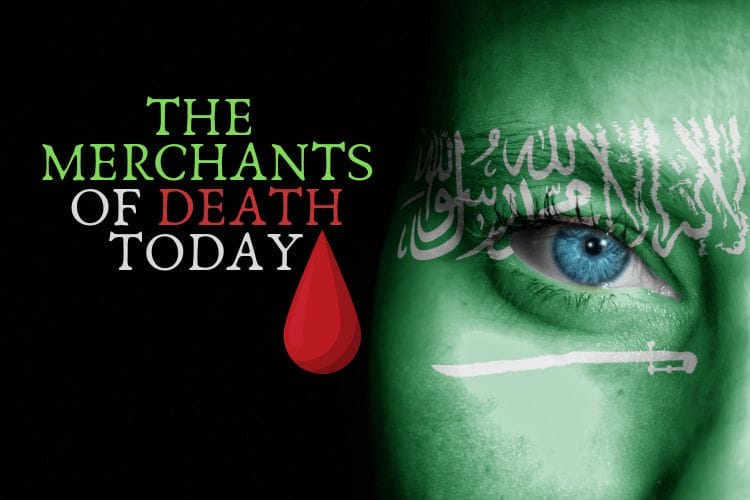The Merchants of Death Today

The lack of official response to the murder of journalist Jamal Khashoggi highlights the power of the military-industrial complex, the modern day Merchants of Death.
The Military Industrial Complex, the Merchants of Death, Today
The killing of Jamal Khashoggi by agents of Saudi Arabia has raised more discussion on arms sales to Saudi Arabia than the wide use of U.S.-made weapons in the Saudi-led war in Yemen. Some countries have suspended their arms sales to Saudi Arabia, but, for the moment, not the largest of the sellers- the U.S.A. Nevertheless, the consequences of the sale of arms are currently in a sharper spotlight than usual. We need to turn attention to action for better control of the arms trade and the merchants of death.
Arms sales (or “gifts”) always have at least two purposes — the one, political influence, and the other economic. While some “merchants of death” especially private arms dealers are largely influenced by a desire for money, politics and the place of arms in the national economies of the major countries selling arms makes arms sales a question of national politics.
There have been occasional efforts on the part of non-governmental organizations to limit or abolish the arms trade, but the “campaigns against the arms trade” have never become internationally coordinated efforts over time. Moreover, they have rarely involved people beyond those already working for disarmament or conflict resolution through mediation. The military-industrial complex, the Merchants of Death, highlighted by President Eisenhower (but only as he was leaving office) is still going strong, to which must now be added a significant mercenary wing of private security forces. The end of the Cold War did little to change the arms industries, and the hoped-for “peace dividend” was never added to development aid.
Vijay Mehta has written a lively overview of the arms sales issue, a useful “campaign tool” especially for those put off by the dry prose and statistics of the yearly reports of the Stockholm International Peace Research Institute where most of the information he uses is found. (1) Mehta sets out his aim “to join the dots between the world of finance which collapsed so spectacularly in 2008; the real economy where raw materials are fashioned into valuable objects for trading and the underlying motivations of war and militarization. Once this analysis becomes clear, the astonishing gulf between the wealth and stability of some countries that is not a natural gulf. History teaches us that the spread of prosperity is not a zero-sum game but one which benefits all humanity. Human security can only be enhanced by adopting a strategy of disarmament and demilitarisation, freeing up resources for constructive economic, political and cultural development.”
Fortunately for organizing a worldwide campaign against the arms trade, there are only a handful of States which manufacture and sell arms on a significant scale: the USA, Germany-England-France together within the European Union, Russia and China. The same States which sell the most arms also spend the most on their military: in order: the USA, China and then roughly the same amount: France, UK, Russia. There are a few countries which make and sell sophisticated arms, and they would probably follow international codes were any set: Sweden, Switzerland, Israel, and Brazil. Japan also builds sophisticated arms, but for political reasons, they are mostly for political use. Likewise, fortunately, the number of countries with enough money to buy such arms is also limited: Saudi Arabia and the Gulf States being good markets. Arms to dictators may be politically significant to control opposition and deadly if used but are not economically significant.
Thus we need to build an informed and concerted campaign against the “merchants of death” basically in the USA, the European Union, China, Russia, and the Arab world. Anti-arms trade movements in India and Pakistan would be useful, but their arms are a reflection of deeper socio-political tensions which need to be addressed even if there were no arms race between the two.
We must not underestimate the strength of the opposition to such a world campaign against the arms trade. The salary of the President of Lockheed Martin, one of the biggest defense contractors in the US, was $19.million in 2010. With 136,000 employees, Lockheed has a corps of supporters who will argue that defense spending supports the economies of local communities. They will mobilize support on the issue among firms that can be competitors in other ways — Boeing, Northrop, General Dynamics, etc. The “Swift Boat” attacks against Senator John Kerry during the 2004 election campaign are a reminder that it is not always a “fair fight.”
Moreover, as Mehta points out “One reason the military-industrial complex is so profitable is that national leaders undertake sales missions on its behalf…The European military-industrial complex exists to extract natural resources at preferential rates and to arm the tyrannical governments of corrupt, artificial nations against both their built-in and their people.”
Although there are some active but small NGOs or networks which focus on the arms trade such as the International Action Network on Small Arms (2) and the European Network Against Arms Trade (3), it is likely that it is only the multi-focused peace organizations which have the staff and the outreach to structure a campaign to limit and ultimately abolish the arms trade.
There needs to be a close analysis of both the forces which “push” arms from the major arms States as well as the “pull” factor — why do States (or their leaders) believe that they need to buy arms for their stability.
While some of Mehta’s writing is in a polemic style — a challenge to the hypocrisy of the Western States that preach human rights and development but promote militarism and chaos — he sets out the major issues as a call to action. How we respond and how we find entry-points, should be on the agenda of peace movements.
Notes:
1) Vijay Mehta. The Economy of Killing (London: Pluto Press, 2012, 237pp.)
2)www.iansa.org
3)www.enaat.org
You will also enjoy On Sea as on Land: New Russia-Ukraine Tensions
About the Author
René Wadlow is a member of the TRANSCEND Network for Peace Development Environment. He is President of the Association of World Citizens, located in Geneva, Switzerland, an international peace organization with consultative status with ECOSOC, the United Nations organ facilitating international cooperation and problem-solving in economic and social issues, and editor of Transnational Perspectives.
Rene Wadlow is the President of the Association of World Citizens, located in Geneva, Switzerland.





